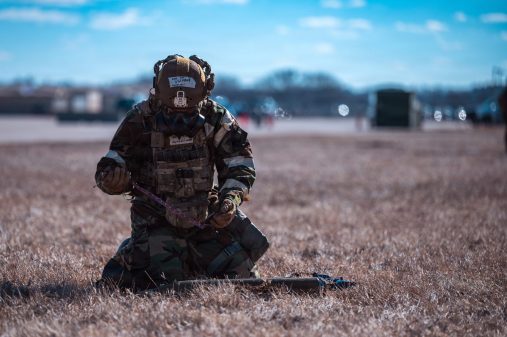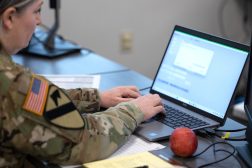AFRL’s ‘LabVerse’ looking at AI for system modernization

An Air Force Research Laboratory initiative that kicked off last year to enhance the department’s digital modernization efforts is bearing fruit for artificial intelligence, according to a senior official.
AFRL stood up an environment called the “LabVerse” around the time it created a new Digital Capabilities Directorate in March 2023.
“LabVerse is one of the ways, in essence, how we bring this information flow together more dynamically. So whether that is things from AI sandboxes, being able to let people play kind of that DevSecOps initial stage, all the way to being able to look at security as a service,” Alexis Bonnell, CIO and leader of the Digital Capabilities Directorate, told DefenseScoop Thursday at the GovCIO Media & Research AI Summit.
One “thing that I’m really excited about when we think about the types of experiments we’re doing in LabVerse is also things like looking at AI for system modernization. And I will tell you … the AI is actually very good at breaking down, for lack of a better term, itself. And so we’ve been able to take a lot of systems that might be in COBOL or Fortran, and you know, quite frankly, we don’t even have the talent in circulation anymore to be running these systems. So part of what we look at is not only how might the AI be able to help us go from those old system languages or programming languages to new, [but] what we didn’t expect is that the AI is also really good at showing us things like … this system has a lot of complex code, this system simple code,” Bonnell said. “We are seeing where partners built things in that maybe make it harder for other partners to follow, which I don’t think we expected to be able to see as easily as we can. And so there is a lot … in this learning by doing.”
She also highlighted the Air Force Research Lab’s experimental chatbot initiative, dubbed NIPRGPT because it’s intended to be used on the Non-classified Internet Protocol Router Network (NIPRNet). The platform, released about five months ago, allows airmen, guardians, civilian employees and contractors to interact with generative artificial intelligence. Officials are seeking feedback from users that could inform future investments and applications of those types of capabilities.
At Thursday’s summit, Amanda Bullock, the artificial intelligence lead at the Air Force Research Lab, told DefenseScoop that there’s been a lot of enthusiasm about NIPRGPT. The main use cases that service members have been employing it for, so far, are summarization of documents, drafting of documents and coding assistance.
However, Bonnell noted that officials are trying to serve as honest brokers for advising people about artificial intelligence capabilities.
“One of the most exciting things about AFRL is we serve a little bit as like a third-party agnostic consultant, if you will. And especially in the area of AI, we have so many people coming to us saying, ‘Is this thing good for AI?’ And sometimes the answer is ‘no,’” Bonnell said.
“We have, you know, a team that can actually add some AI into your system. But also with Amanda’s team, she’s looking at all of the commercial tools,” Bonnell noted. “And so LabVerse also includes the ability to understand, if you have this use case, you know, this small business already solved that right, or this large company already has an app for that. We call it wormholing the OODA Loop — meaning taking someone from, you know, an observation state to an end state.”
AFRL aims to be flexible with the LabVerse as warfighters’ needs evolve.
“One of the things we’re trying to do with LabVerse is to make sure that it is flexible to meet the demands we’re getting. So as an example, you know, one of the recent questions was: Can we do a decision, you know, analytics that kind of goes through a lot of the same education process … as many of our airmen or guardians, and then have kind of a battle buddy, right, informationally? So that is not a question that we got asked a year ago. And so I think what we’re trying to do is to make sure that LabVerse, instead of being a time capsule, that functions with humility to say we don’t even know what’s coming two weeks from now, six months from now — so how do we make it as adaptable a spinal cord, if you will, to be able to meet those new requests, those moments? And then, quite frankly, really making sure that we are humble enough and smart enough to know that, if that’s not our jam, or if someone else has already solved that, to actually be the first people to say, ‘Don’t reinvent that. Don’t do that. You know, find that over there,'” Bonnell said.






